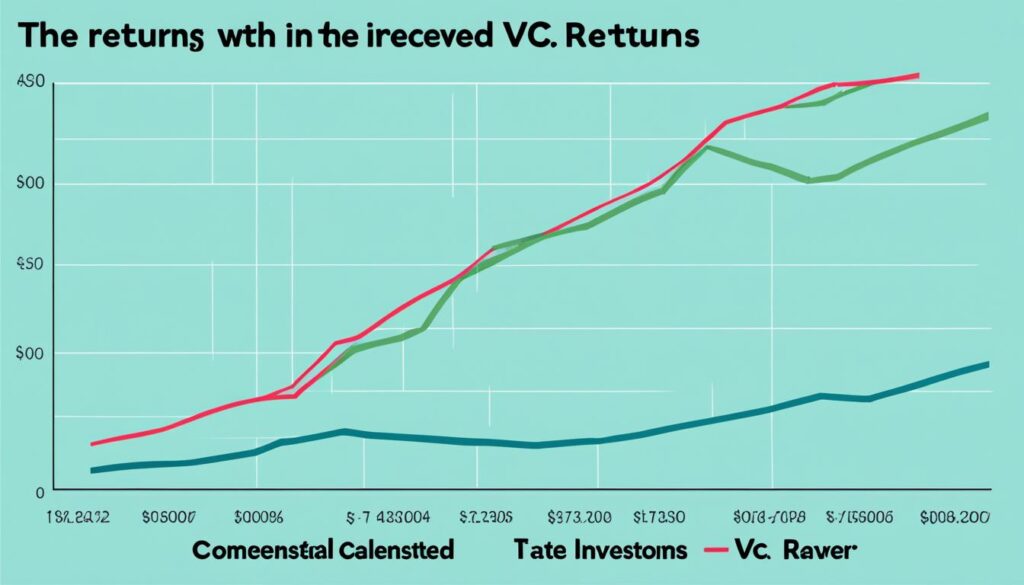Becoming a venture capitalist (VC) may sound like an exciting and prestigious career, but the reality is quite different from the allure. To be a successful VC, you don’t just need the right skills, experience, and connections – you also need a significant amount of personal wealth. While venture capitalists don’t necessarily invest their own assets, having a large personal net worth makes it much easier to break into the investment scene.
So, the big question is: How much money do you really need to become a VC investor? In this article, we’ll dive into the world of venture capitalism and explore the financial requirements, the investment process, and the challenges that come with this high-stakes career.
Key Takeaways
- Becoming a venture capitalist requires a significant amount of personal wealth, in addition to the necessary skills and experience.
- VCs are not always investing their own assets, but having a large personal net worth makes it easier to break into the investment scene.
- The venture capital industry is highly competitive, with a focus on finding and funding promising startups with high growth potential.
- VCs evaluate investment opportunities based on factors like market opportunity, revenue potential, cost structure, and financial projections.
- The venture capital process involves deal structuring, due diligence, and portfolio management to manage risk and maximize returns.
Understanding Venture Capitalists
The world of venture capitalism is a fascinating one, filled with individuals who play a crucial role in fueling the growth of innovative startups and young companies. But what exactly is a venture capitalist (VC), and what is their role in the venture capital industry?
What is a Venture Capitalist?
A venture capitalist is an investor who provides financial backing and strategic guidance to companies with high growth potential, typically in exchange for an equity stake. These investors are willing to take on the risk of investing in these early-stage enterprises because the potential return on investment (ROI) can be substantial if the company is successful.
The Role of Venture Capitalists
Venture capitalists play a vital role in the VC firm structure by providing not only financial resources but also valuable guidance and expertise to the companies they invest in. They often serve on the board of directors, offering strategic advice, industry insights, and connections to help the startup navigate the challenges of growth and expansion.
Sources of Venture Capitalists
Venture capitalists can come from a variety of backgrounds, including angel investors, former entrepreneurs, investment bankers, and even former executives of successful companies. The diverse types of venture capitalists bring a wealth of experience and expertise to the table, which is invaluable for the startups they support.

Requirements to Become a Venture Capitalist
Becoming a successful venture capitalist (VC) requires a combination of specialized education, extensive professional experience, and a strong network within the investment community. The first source highlights the key prerequisites for aspiring VCs to consider.
Educational Background
A Master of Business Administration (MBA) degree, particularly from prestigious universities like Harvard or Stanford, is a common educational background among venture capitalists. In fact, over 50% of VCs hold such prestigious credentials, which provide them with the necessary analytical and strategic skills to evaluate investment opportunities and guide their portfolio companies.
Professional Experience
In addition to a strong educational foundation, VC industry experience is crucial for breaking into the venture capital field. Many VCs have prior experience in fields such as investment banking, management consulting, or entrepreneurship, which equips them with a deep understanding of the startup ecosystem, financial modeling, and value creation.
Network and Reputation
Cultivating a robust network and establishing a reputable standing within the venture capital community are also essential requirements. Successful VCs often leverage their extensive connections to source promising deals, conduct thorough due diligence, and provide strategic guidance to their portfolio companies. Building a track record of successful investments and a reputation for integrity can significantly enhance a VC’s ability to attract high-quality dealflow and secure a competitive advantage in the industry.

| Key Requirement | Explanation |
|---|---|
| VC education requirements | An MBA degree, especially from prestigious universities, is common among venture capitalists, with over 50% holding such credentials. |
| VC career path | Many VCs have prior experience in fields like investment banking, management consulting, or entrepreneurship, which provides them with valuable industry knowledge and skills. |
| VC industry experience | Extensive experience within the venture capital ecosystem is crucial for evaluating investment opportunities and guiding portfolio companies effectively. |
| VC networking and reputation | Building a strong network and a reputable standing in the venture capital community are essential for sourcing deals, conducting due diligence, and securing a competitive advantage. |
How much money do you need to be a VC investor?
Contrary to popular belief, becoming a successful venture capitalist (VC) does not necessarily require a massive personal fortune. While having a significant net worth can certainly help facilitate connections and open doors within the VC ecosystem, the reality is that VCs are primarily investing third-party funds rather than their own personal wealth.
Personal Wealth Requirements
The VC personal wealth threshold to break into the industry is not as high as one might assume. Many successful VCs have accumulated substantial personal wealth over time through savvy investments and their own entrepreneurial pursuits, but this is not an absolute prerequisite. What is more important is the ability to effectively manage and deploy third-party investment capital to support promising startups.
Managing Third-Party Assets
The core function of a venture capitalist is to identify, evaluate, and invest in high-potential startup companies on behalf of their investors. VCs are responsible for managing third-party funds, which may come from institutional sources like pension funds, endowments, or private individuals. The VC investment capital requirements are largely defined by the resources and risk appetite of these third-party investors, rather than the personal wealth of the VC themselves.
By focusing on their ability to source, vet, and add value to portfolio companies, VCs can build successful careers without necessitating a personal net worth in the hundreds of millions. The key is demonstrating a proven track record of identifying and supporting high-growth startups that deliver outsized returns to their investors.

Evaluating Investment Opportunities
When it comes to venture capital investments, VC investment evaluation is a critical process that involves carefully assessing a startup’s potential. According to the second source, one of the primary considerations for venture capitalists is the startup market analysis – the uniqueness of the product or service the company is offering and the potential market size for that offering.
Market Opportunity Assessment
Venture capitalists closely examine the startup market analysis to determine the size and growth potential of the target market. They assess the competitive landscape, industry trends, and the company’s ability to differentiate itself and capture a significant market share. This analysis helps them gauge the startup revenue potential and the scalability of the business model.
Revenue Potential Analysis
Another crucial factor in VC investment evaluation is the startup revenue potential. Venture capitalists scrutinize the company’s pricing strategy, customer acquisition channels, and projected revenue streams to determine the long-term revenue growth and profitability of the business.
Cost Structure Evaluation
Alongside revenue potential, venture capitalists also carefully evaluate the startup cost structure to assess the startup profitability. They analyze the company’s fixed and variable costs, operational efficiency, and scalability of the cost structure to ensure the business model is sustainable and can generate attractive returns on investment.
Profitability and Financial Projections
Ultimately, venture capitalists consider the startup profitability and financial projections to determine the overall investment potential. They assess the company’s ability to achieve profitability, the timeline for reaching that milestone, and the potential for significant returns on their investment. This comprehensive analysis helps venture capitalists identify the most promising investment opportunities that align with their investment thesis and risk-return objectives.

The Venture Capital Process
The venture capital process involves several critical steps that venture capitalists (VCs) must navigate to identify, evaluate, and ultimately invest in promising startup opportunities. Among the key components of this process are deal structuring, due diligence, and portfolio management.
Deal Structuring
At the heart of the VC process is deal structuring, where VCs negotiate the terms of their investment to ensure that the structure aligns with their risk-return objectives. This includes determining the appropriate valuation of the startup, the percentage of equity they will acquire, and the rights and obligations of all parties involved. Skilled VC deal structuring is essential to mitigating risks and maximizing potential returns.
Due Diligence
Before committing their capital, VCs must conduct a thorough VC due diligence process to assess the viability and growth potential of the startup. This comprehensive review examines aspects such as the market opportunity, the company’s competitive positioning, the strength of the management team, the financial health, and the potential risks and challenges. The due diligence process helps VCs make informed investment decisions.
Portfolio Management
Once an investment has been made, VCs shift their focus to active VC portfolio management. This involves closely monitoring the startup’s progress, providing strategic guidance and resources, and actively participating in the company’s decision-making process. VCs leverage their expertise and network to help portfolio companies navigate challenges and capitalize on growth opportunities.

Challenges and Risks
The venture capital industry is not without its fair share of challenges and risks. One of the primary hurdles faced by VC investors is the intense competition for investment opportunities. With a growing number of aspiring investors and entrepreneurs vying for access to third-party equity financing, VCs must navigate a highly competitive landscape to identify and secure the most promising startups.
Competition for Investment Opportunities
The fierce competition in the VC industry is further exacerbated by the high startup failure rates, which can make it challenging for VCs to consistently identify and fund successful ventures. According to industry reports, the failure rate for startups can range from 50% to 90%, depending on the sector and stage of development, posing significant risks for VC investors.
Startup Failure Rates
In addition to the competitive landscape and startup failure risks, venture capitalists also face the challenge of balancing their work-life balance. The VC industry is known for its demanding workload, with VCs often required to juggle multiple investment opportunities, manage their existing portfolio companies, and maintain an extensive network of industry contacts. This intense pace can take a toll on work-life balance, potentially leading to burnout and reduced productivity over the long term.
Time Commitment and Work-Life Balance
Despite these challenges, the venture capital industry continues to attract talented individuals seeking to capitalize on the potential for high returns and the thrill of backing transformative startups. By navigating the competitive landscape, managing the risks associated with startup failures, and maintaining a healthy work-life balance, successful VCs can play a vital role in driving innovation and supporting the growth of promising companies.

Compensation and Returns
Venture capital firms can generate significant income through two primary revenue streams: management fees and carried interest. These compensation models are designed to align the interests of the VC firm with the success of the startups they invest in, ultimately driving higher VC investment returns for their limited partners.
Management Fees
VC firms typically charge an annual management fee, usually between 1-2% of the total assets under management. This fee covers the firm’s operational expenses, including employee salaries, office costs, and other overhead. The management fee provides a steady source of income for the VC firm, regardless of the performance of their investment portfolio.
Carried Interest
In addition to management fees, VCs can earn a share of the profits generated by their investments, known as carried interest. Carried interest typically ranges from 15-20% of the total investment returns. This incentivizes the VC firm to carefully select and actively manage their portfolio companies, as their compensation is directly tied to the success of the investments.
Potential for High Returns
While the venture capital industry can be highly competitive and risky, the potential for high investment returns is a significant draw for both VC firms and their limited partners. Successful VC investments can generate returns of 10x or more, providing substantial payouts to the firm and its investors. This prospect of outsized returns is a key factor in the continued attractiveness of the VC compensation model.

Building a Reputation as an Angel Investor
For many aspiring venture capitalists, the path to success often begins with becoming an angel investor. By building a track record of successful investments as an angel investor, individuals can establish a reputation and credibility within the venture capital ecosystem.
Angel investing offers a unique opportunity to gain valuable experience and insights into the startup landscape. As an angel investor, you can not only provide much-needed funding to promising early-stage companies but also offer strategic guidance and mentorship to the founders. This hands-on involvement can be instrumental in developing the skills and network required to transition into a full-fledged venture capitalist role.
Moreover, active participation in the angel investing community can help build your reputation and enhance your career progression within the venture capital industry. By demonstrating your ability to identify and support successful startups, you can position yourself as a savvy investor with a keen eye for emerging trends and market opportunities.
| Benefits of Building a Reputation as an Angel Investor | Challenges of Transitioning from Angel Investing to Venture Capital |
|---|---|
|
|
Overall, building a reputation as an angel investor can be a strategic stepping stone for aspiring venture capitalists. By demonstrating your ability to identify and support successful startups, you can enhance your credibility and position yourself for a seamless transition into the venture capital industry.

Exploring Alternative Funding Methods
While venture capital remains a significant source of funding for startups, the industry faces growing competition from alternative capital-raising methods, such as crowdfunding and other investment platforms. These emerging options offer entrepreneurs and small business owners additional pathways to secure the necessary funds to bring their innovative ideas to life.
Crowdfunding
Crowdfunding has emerged as a popular alternative to traditional venture capital, providing startups with a platform to directly engage with a large network of potential investors. Platforms like Kickstarter, Indiegogo, and Crowdrise allow entrepreneurs to showcase their products or services and solicit small contributions from a diverse pool of backers. This approach not only provides much-needed funding but also helps build a loyal customer base and generate early market validation.
Other Investment Platforms
In addition to crowdfunding, startups are increasingly exploring other investment platforms that cater to a broader range of investors. Online marketplaces, such as AngelList and SeedInvest, connect entrepreneurs with accredited and non-accredited investors, expanding the pool of potential funding sources beyond traditional venture capitalists. These platforms often offer more accessible investment opportunities, allowing individuals to participate in the growth of promising startups.

A Day in the Life of a Venture Capitalist
For venture capitalists (VCs), a typical day is filled with a dynamic mix of activities, from monitoring the latest industry trends to engaging with their portfolio companies. The VC daily routine serves as the foundation for their investment decisions and ongoing portfolio management.
Morning Routine
The day often begins with a deep dive into respected industry publications and websites, such as Investopedia, to stay informed about potential investment opportunities, new companies, and market trends. This research helps VCs identify emerging sectors and technologies that may present attractive investment prospects.
Meetings and Discussions
As the day progresses, VCs engage in a series of VC meetings and discussions, both internally with their investment team and externally with founders, industry experts, and other stakeholders. These meetings allow VCs to exchange ideas, gather market insights, and evaluate the viability of potential investments.
The ability to network and build strong relationships is crucial for venture capitalists, as it enables them to source and vet the most promising investment opportunities. Regular meetings and discussions help VCs stay at the forefront of industry trends and maintain a pulse on the rapidly evolving startup ecosystem.
Portfolio Company Interactions
A significant portion of a VC’s time is dedicated to actively managing their VC portfolio of investments. This involves regular check-ins with portfolio companies, providing strategic guidance, and monitoring their progress. VCs work closely with the founders and management teams to help them navigate challenges, identify growth opportunities, and maximize the potential for successful exits.
By maintaining a hands-on approach to portfolio management, VCs are able to leverage their industry expertise and network to support the growth and development of their investments, ultimately driving returns for their limited partners and building their own reputation within the venture capital ecosystem.
Conclusion
In the dynamic world of venture capitalism, becoming a successful investor requires a delicate balance of specialized skills, extensive experience, a robust network, and a significant personal wealth. While the allure of being a VC may seem impressive, the reality involves a demanding workload, high levels of competition, and the challenge of navigating the inherent risks associated with investing in startups.
As the VC industry overview suggests, the venture capital landscape continues to evolve, with new funding methods and investment platforms emerging to challenge the traditional model. However, the core principles of identifying unique products, assessing market potential, and managing a diverse portfolio remain essential for those seeking to make an impact as a venture capitalist.
Ultimately, the key takeaways for aspiring VCs are clear: a strong educational foundation, a wealth of industry experience, and a commitment to tireless networking and research are all critical components for success in this highly competitive field. By embracing these factors and navigating the inherent risks, venture capitalists can position themselves to identify and support the next generation of innovative startups that will shape the future.
